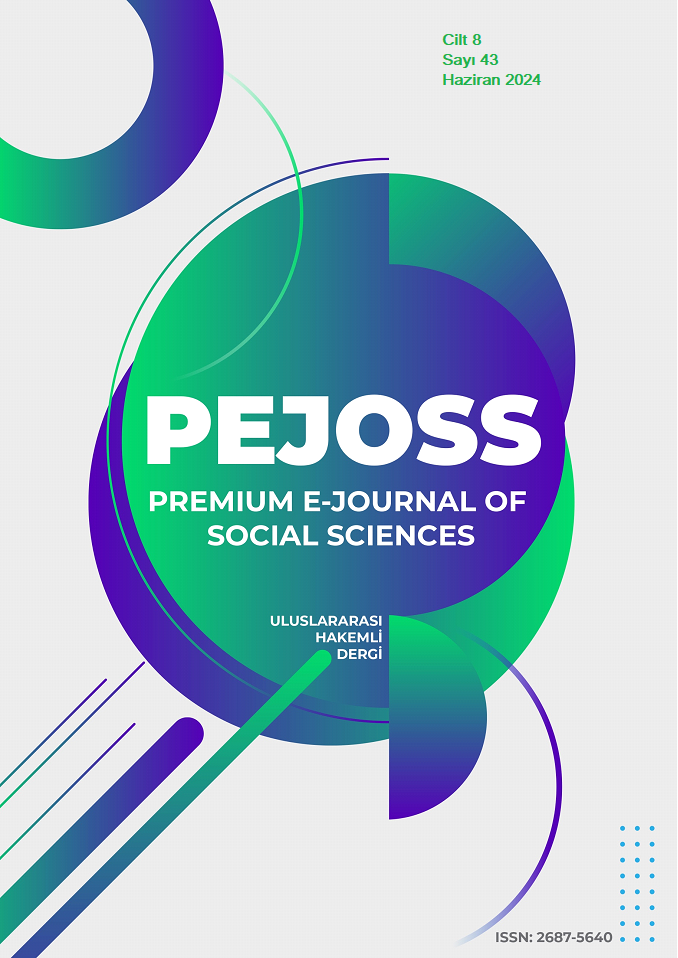Absolute Mutashabih Concepts in al-Ḥākim al-Jushamī’s Tafsir Titled al-Tahdhīb fī al-Tafsīr
DOI:
https://doi.org/10.5281/zenodo.12603972Keywords:
Tafsīr, al-Hākim al-Jushamī, al-Tahdhīb fī al-tafsīr, Muhkam, Absolute MutashabihAbstract
In this article, absolute mutashabihs in al-Hākim al-Jushamī’s tafsīr titled al-Tahdhīb fī al-tafsīr were investigated. In the 7th verse of the Sūrat Āl ʿImrān, it is mentioned that some of the verses of the Qur’ān are muhkam and some are mutashabih. Muhkam means a verse that does not require any explanation to know its meaning. What is meant by mutashabih is a verse that cannot be explained clearly. Since mutashabih is a verse that cannot be explained clearly, various opinions have been put forward by scholars regarding the determination of mutashabih and muhkam verses. According to some scholars, the verses of the Qur’ān are divided into three when compared to each other: Absolute muhkam, absolute mutashabih and in one aspect muhkam and the other mutashabih. Concepts such as al-rūh, dābba al-ardh, al-sūr, al-hurūf al-muqattaa, al-istiwā, al-arsh, al-kursu, lawh al-mahfūz, al-qalam, sidra al-muntahā, bayt al-mamūr, which are mentioned in the Qur’ān and whose nature is known only to Allah, are concepts that fall within the scope of absolute mutashabih. Our research is limited to the absolute mutashabih concepts in the tafsīr of the Mu‘tazilite mufassir al-Jushamī. The aim of the research is to reveal how al-Jushamī handles and evaluates the absolute mutashabihs in the Holy Qur’ān in his tafsīr titled al-Tahdhīb fī al-tafsīr and whether he interprets the relevant concepts. In this research, al-Jushamī’s 10-volume tafsīr titled al-Tahdhīb fī al-tafsīr was examined using the literature review method. In addition, the works of other authors who would contribute to our research were also used.
Downloads
References
Ahmed b. Hanbel, E. A. (1421/2001). el-Müsned. Müessesetu’r-Risâle.
Bezzâr, E. A. (2009). el-Müsned (el-Bahrü’z-Zehhâr). Mektebetü’l-‘Ulûm ve’l-Hikem.
Buhârî, E. A. M. (1422). el-Câmiu’s-sahîh. (Cilt 1-9). Dâru Tavki’n-Necât.
Cevherî, E. N. (1407/1987). es-Sıhâh tâcu’l-luga ve sıhâhu’l-‘Arabiyye (4. Baskı.). Dâru’l-‘İlm li’l-Melâyîn.
Çelebi, İ. (2001). Kādî Abdülcebbâr. Türkiye diyanet vakfı İslâm ansiklopedisi, (Cilt. 24, s. 105- 109). TDV Yayınları.
Ezherî, E. M. (2001). Tehzîbu’l-luga. Dâru İhyâi’t-Turâsi’l-‘Arabî.
Hâkim el-Cüşemî, E. S. (1439-1440/2018-2019). et-Tehzîb fi’t-tefsîr. Dâru’l-Kitâb el-Lübnânî.
Halîl b. Ahmed, E. A. (ts.). Kitâbü’l-‘ayn. Dâru’l-Hilâl.
İbn Atıyye el-Endelüsî, E. M. (1422). el-Muharreru’l-vecîz fî tefsîri’l-kitâbi’l-‘azîz. Dâru’l-Kütübi’l-‘İlmiyye.
İbn Ebî Hâtim, E. M. (1419). Tefsîru’l-Kur’âni’l-‘Azîm (3. Baskı.). Mektebetu Nizâr Mustafa el-Bâz.
İbn Fâris, E. A. (1399/1979). Mu‘cemu makâyîsi’l-luga. Dâru’l-Fikr.
İbn Manzûr, E. C. (1414). Lisânü’l-‘Arab (3. Baskı.). Dâru Sâdır.
İbnü’l-Münzir, E. B. (1423/2002). Kitâbu Tefsîri’l-Kur’ân. Dâru’l-Mâsir.
Müslim, E. M. (ts.). el-Câmiu‘s-sahîh. (5 Cilt). Dâru İhyâi’t-Turâsi’l-‘Arabî.
Nevevî, E. Z. (1392). el-Minhâc fî şerhi Sahîhi Müslim b. el-Haccâc. (18 Cilt). Dâru İhyâi’t-Turâsi’l-‘Arabî.
Râgıb el-İsfahânî, E. H. (1412). el-Müfredât fî garîbi’l-Kur’ân. Dâru’l-Kalem-ed-Dâru’ş-Şâmiyye.
Süyûtî, H. E. (ts.). el-İtkân fi ʻulûmi’l-Kur’ân. Vizâratü‘ş-Şuûni’l-İslâmiyye ve’l-Evkâf ve’d-Da’ve ve’l-İrşâd.
Şâtıbî, E. İ. (ts.). el-Muvâfakât. (3 Cilt). el-Matba‘atü’r-Rahmâniyye.
Taberî, E. C. (1420/2000). Câmi‘u’l-beyân ‘an te’vîl-i âyi’l-Kur’ân. (24 Cilt). Müessesetu’r-Risâle.
Zebîdî, E. M. (ts.). Tâcu’l-arûs min cevâhiri’l-kâmûs. Dâru’l-Hidâye.
Zemahşerî, E. C. (1419/1998). Esâsu’l-belâğa. Dâru’l-Kütübi’l-‘İlmiyye.
Zerkeşî, B. M. (1404/1984). el-Burhân fî ʿulûmi’l-Kurʾân (3. Baskı.). Dâru’t-Turâs.
Downloads
Published
How to Cite
Issue
Section
License
Copyright (c) 2024 Premium e-Journal of Social Science (PEJOSS)

This work is licensed under a Creative Commons Attribution 4.0 International License.


